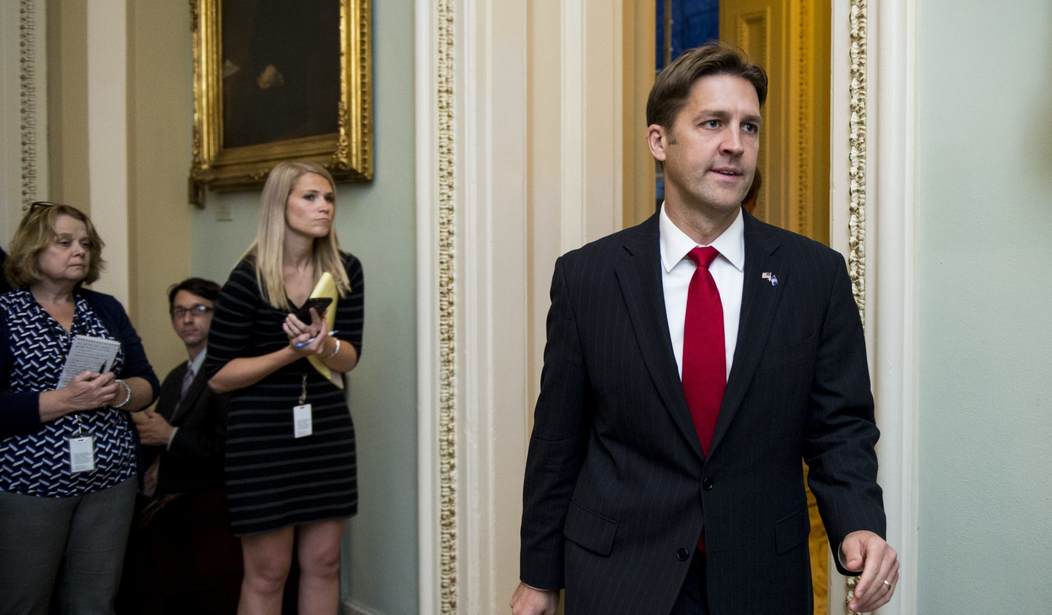Nebraska Senator Ben Sasse delivered a fiery speech on the floor of the Senate Wednesday, rebuking his colleagues who have tried in recent months to impose religious tests for nominees to the federal judiciary. The junior senator from the Cornhusker State also introduced a resolution reaffirming the Constitution’s religious liberty protections.
“I want Senators to unanimously reaffirm our oath of office to a Constitution that rejects religious bigotry,” Sasse said. “It is useful to regularly remind ourselves that Americans are a First Amendment people. Each of the five freedoms in the First Amendment: speech, press, religion, assembly, protest, they define who we are.”
It should go without saying that Americans have an inalienable right to worship however they please and practice their religion freely, but those rights have come under attack in recent years with the ascendency of secularism and the advances of the sexual revolution. The progressive left, for whom abortion rights and LGBTQ advocacy are near sacraments, will stop at nothing, it seems, in their quest to ensure that our nation’s Judeo-Christian values are consigned to the dust bin of history. The moral revolutionaries have been successful beyond their wildest dreams at shaming Americans into rejecting the moral values that held our nation together for more than 200 years. Case in point, the shocking religious bigotry shown by members of the Senate in recent confirmation hearings.
Sasse blasted his colleagues on the Senate Judiciary Committee for their recent attempts to smear Brian Buescher, President Trump’s nominee to the U.S. District Court for Nebraska, because he is a member of the Knights of Columbus, a Catholic fraternal organization.
In written questions sent to Buescher by committee members on December 5, Sen. Mazie Hirono (D-Hawaii) stated that “the Knights of Columbus has taken a number of extreme positions. For example, it was reportedly one of the top contributors to California’s Proposition 8 campaign to ban same-sex marriage.” She went on to ask Buescher if he would quit the Knights of Columbus if confirmed, “to avoid any appearance of bias.”
Sen. Kamala Harris (D-Calif.) asked Buescher if he was aware when he joined the Knights of Columbus at age 18 that the group was an “all-male society” that opposed “a woman’s right to choose” and “marriage equality.”
“This is nuts,” Sasse told his colleagues in the Senate. “We’re talking about the largest Catholic fraternal organization in the world being called an extremist organization and a nominee for the federal bench being asked if he would resign from this organization so that he could serve without the appearance of bias.”
“The clear implication,” Sasse said, “was that Brian’s religious beliefs and his religious affiliations, in this case an affiliation with the Catholic organization that invests countless hours and millions of dollars annually serving special needs kids,” made him “potentially unfit for federal service.”
This isn’t’ the first time in recent months that a religious test for office has been suggested by a member of the Senate. Sen. Dianne Feinstein (D-Calif.) shockingly derided Court of Appeals nominee Amy Coney Barrett because “the dogma lives loudly within you,” a reference to Barret’s Catholic faith.
Why are we seeing a rise in religious bigotry from those in positions of power and influence? It’s simple, really. Any time you hear about attacks on religious liberty you can almost guarantee that it’s about two issues: abortion rights and gay rights, both of which must be protected at all costs by the cultural revolutionaries on the left. (Well, those issues and rank anti-Semitism, but that’s a discussion for another day.) The fact that lawmakers and cultural influencers have become so brash about their bigotry shows they are confident that American voters are increasingly on their side — which doesn’t bode well for individuals and families with deeply held religious convictions.
Sasse went on to remind his fellow senators that Democratic President John F. Kennedy also faced anti-Catholic bigotry when he ran for president.
Kennedy told the Greater Houston Ministerial Association in 1960:
I believe in an America where the separation of church and state is absolute–where no Catholic prelate would tell the President (should he be Catholic) how to act, and no Protestant minister would tell his parishoners for whom to vote–where no church or church school is granted any public funds or political preference–and where no man is denied public office merely because his religion differs from the President who might appoint him or the people who might elect him.
I believe in an America that is officially neither Catholic, Protestant nor Jewish–where no public official either requests or accepts instructions on public policy from the Pope, the National Council of Churches or any other ecclesiastical source–where no religious body seeks to impose its will directly or indirectly upon the general populace or the public acts of its officials–and where religious liberty is so indivisible that an act against one church is treated as an act against all.
For while this year it may be a Catholic against whom the finger of suspicion is pointed, in other years it has been, and may someday be again, a Jew–or a Quaker–or a Unitarian–or a Baptist. It was Virginia’s harassment of Baptist preachers, for example, that helped lead to Jefferson’s statute of religious freedom. Today I may be the victim- -but tomorrow it may be you–until the whole fabric of our harmonious society is ripped at a time of great national peril.
Many were suspicious of Kennedy at the time, suggesting that he might be more loyal to Rome than to the Constitution of the United States. He shot down that notion, vowing that if the office “would require me to either violate my conscience or violate the national interest, then I would resign the office.” He went on to say, “I do not intend to apologize for these views to my critics of either Catholic or Protestant faith — nor do I intend to disavow either my views or my church in order to win this election. ”
Nor should he have. Nor should Buescher or any other American. But that’s where we are in 2018 America — religion is being marginalized, stigmatized, and treated as though it is as abhorrent as racism.
Sasse said that his resolution is simply reaffirming with Kennedy “and with countless other Americans across 230 years — Protestant and Catholic, Jew and Muslim, Hindu and Buddhist, agnostic, atheist, and more” that “America is big enough for disagreements.”
“We are saying that we believe the U.S. government is not in the business of trying to resolve debates about heaven and hell,” he explained. “Rather, the business of the U.S. government is to preserve peace and order so that you and your neighbors can precisely wrestle about things like heaven and hell or sports loyalties or dietary preferences.”
“If a senator has a problem with this resolution, you’re probably in the wrong line of work, because this is what America is,” Sasse challenged. “This is a super-basic point — no religious tests. If someone has a problem with this resolution, what other parts of the Constitution are you against? Freedom of the press? Women’s right to vote? Freedom of speech? This isn’t hard. No religious test for serving on the federal bench.”
Sasse’s resolution was approved without objection in the Senate. It remains to be seen whether Democratic senators will abide by the sense of the resolution in future confirmation hearings.
Follow me on Twitter @pbolyard










Join the conversation as a VIP Member